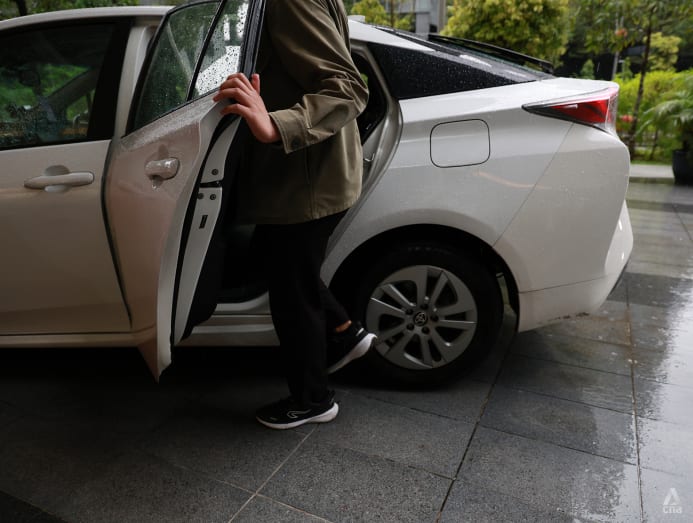Cheap, convenient but dangerous: Why it's so hard to clamp down on illegal carpools
Despite safety risks and legal crackdowns, illegal carpooling services on Telegram chat groups continue to thrive in Singapore where enforcement is difficult and the low fares are attractive for cash-strapped commuters.

Lower fares offered by unregulated carpooling services on Telegram chat groups are the primary reasons that commuters have turned to this platform. (Illustration: CNA/Nurjannah Suhaimi)

This audio is generated by an AI tool.
Before she booked her first ride with an illegal carpool driver on the Telegram mobile application, 18-year-old student Faa received warnings from her friends: You’ll meet all sorts of people. Never sit in the front. Never pay in advance.
It did not sound 100 per cent safe, but like many young students looking for ways to save money, she decided to take the plunge and started using the illegal service earlier this month to travel from the eastern part of the island to the city, where her school is.
As it is, she already had an unpleasant encounter. During one ride, the driver pressed her to have a meal with him before dropping her off at her destination.
“He kept asking if I liked biryani or prata and insisted that we should eat together,” the university student said, declining to reveal her full name since the carpooling service is illegal in Singapore.
“Before that, he was talking to me nicely. And I’m a talkative person, so I chatted with him like I normally would with private-hire drivers.”
Feeling uneasy, she resorted to a threat: “I told him I have several family members who are lawyers, so if he did anything funny, I’d sue him.”
Although she made it home safely, the interaction deeply unsettled Ms Faa.
However, she soon realised through more conversations with her friends that such horror stories are common among passengers who frequently use these carpooling services.
Indeed, several passengers who frequently use these services, typically accessed via the Telegram messaging app, shared similarly distressing stories. Most of them spoke to CNA TODAY on the condition of anonymity.
Some said that they had received inappropriate messages from strangers or potential drivers, while others have had to deal with such propositions in person.
Mr Jun, a sales executive in his 20s, recalled one such encounter that took place at the end of a car ride with a female driver four years ago. Upon arriving at his destination, she told him that his ride would be free if he were to perform a sexual favour for her.
“I just threw some cash at her and immediately ran out of the car,” Mr Jun said.
Ms Megan, a 32-year-old office administrator, started receiving disturbing text messages from strangers after posting a request for a ride in a chat group dedicated to carpooling services. One even offered to pay her for an erotic act.
During one ride, as she was sitting in the front passenger seat, the driver suddenly asked her if she had "needs to be fulfilled", which she quickly inferred was a reference to sex.
“I straight up told him, ‘It seems like you’re married’, based on the toys he had on the dashboard. He quickly switched the topic."
Despite how commonly such horror stories are shared among passengers, illegal carpooling services continue to be popular and have been difficult for the authorities to stamp out, not least because they are cheap.
Fares are negotiated between passenger and driver, and frequent carpoolers told CNA TODAY that these fares are often up to 60 per cent cheaper than those on legal platforms, with some rides even offered for free.

Operating not just within Singapore, providers of illegal carpooling services also cover cross-border travel.
Checks by CNA TODAY found numerous requests for door-to-door rides between various locations in Singapore and Johor Bahru in Malaysia made in Telegram and Facebook groups.
To be sure, those who have used illegal carpooling services to cross the Causeway have their fair share of horror stories as well.
Content creator Azula Cinta Idris, 24, found herself detained at Woodlands Checkpoint with her husband on Feb 25 after their driver, booked for her by her aunt through Telegram, was caught trying to smuggle duty-unpaid cigarettes into Singapore.
The Immigration and Checkpoints Authority said that a total of 165 cartons and 251 packets of duty-unpaid cigarettes were hidden in the roof panel of the Malaysia-registered car.
“I was stunned when I saw the amount of contraband (cigarettes). I really thought I was going to get arrested,” she told CNA TODAY.
Since Ms Azula typically uses taxis approved by the Land Transport Authority (LTA) for cross-border travel, she assumed that the car her aunt had booked was a legitimate service, not knowing that it could be anything else.
“After explaining my situation to the officers, they did their thorough checks and decided that my husband and I were just suay (unlucky), so they let us go. They also warned us against booking illegal transport to travel.”
Carpooling with strangers for a fee, through informal channels such as Telegram chat groups, is illegal due to its informal nature and lack of regulation.
It is also illegal for Malaysia-registered private cars or private-hire cars here to provide cross-border or ride-hail services within Singapore.
These services operate outside the framework of LTA’s rules and have led to concerns about safety, because drivers may not adhere to proper vehicle standards, have the necessary insurance or even a licence.
Last month, a state coroner warned against using carpooling services such as those on Telegram, advising commuters to use private-hire vehicles, taxis or public transport instead.
His warning came after the death of a 21-year-old passenger in a van accident on Dec 31, 2023. The 18-year-old driver, who did not have a valid licence, had been offering rides through a Telegram group.
Other cases have also made headlines. A 23-year-old man was arrested for molesting a 14-year-old passenger who had requested a ride from Yishun to Woodlands through a Telegram chat group in 2023.
He was sentenced to 14 months' jail and three strokes of the cane. He was also fined S$1,800 for other offences, including using his Malaysia-registered car as a public service vehicle without a valid licence.
In 2019, a man who had been suspended from driving for ride-hailing firm Grab targeted female victims seeking rides through Telegram carpooling services, driving young women to secluded places such as a multi-storey car park and a forested area and then molesting them.
He was sentenced to five years and 10 months in prison and six strokes of the cane.
The problem of illegal carpooling services was raised earlier this month in parliament by Ms Yeo Wan Ling, a Pasir Ris-Punggol GRC Member of Parliament, who had asked about the measures being taken to stop such arrangements via online chat groups.
Dr Amy Khor, Senior Minister of State for Transport, said in response that LTA conducts enforcement action against drivers who are found to have provided illegal carpooling services.
She laid out the repercussions:
- Anyone found guilty of offering an illegal carpooling service may face a fine of up to S$3,000 or a jail term of up to six months, or both
- Anyone convicted of providing an illegal carpool matching service may face a fine of up to S$10,000 or up to six months’ jail, or both
- Additionally, a person guilty of providing illegal carpooling services without a valid vocational licence – or employing or allowing someone to do so – may be sentenced to a fine of up to S$1,000 or up to three months in jail, or both
Passengers of such services, however, do not face any penalties.
"Carpooling is only permitted through licensed platforms like GrabHitch and RydePool, permitted licence-exempt business platforms, or among friends and colleagues.
"Any arrangements through informal non-business mediums or chat groups are not allowed. For safety reasons, motorcycle-pooling is completely prohibited regardless of the booking platform," LTA stated.
Experts interviewed by CNA TODAY acknowledged the severity of the punishment for drivers, but said that enforcement is a tricky issue, since multiple underlying factors contribute to the continued prevalence of these illegal services.

WHY PASSENGERS ARE WILLING TO TAKE THE RISK
Despite the risks, passengers interviewed by CNA TODAY, mostly below the age of 30, said that the lower fares offered by unregulated carpooling services on Telegram – known as Telehitch for short – were the primary reason they turned to the platform.
Communications associate Alison Lim, 24, was an active user between 2019 and 2023 – during her student years – booking these rides about two to three times a week.
She has since stopped using these services because she has started working and can now afford to book rides on legitimate ride-hailing apps.
“As a student, cost was my main concern. Grab could get really expensive, but with Telehitch, you could bargain for lower prices,” she said.
Most of Ms Lim’s rides were to and from Nanyang Technological University (NTU) and she would often book Telehitch, particularly when she carried heavy bags. However, the pricing varied significantly depending on the driver.
“For example, NTU to Ang Mo Kio was typically around S$30 with Grab, but I usually paid only S$10 to S$12 through carpooling.”
Ms Lim also said she would receive free ride offers. “But some drivers clearly seemed 'off', like insisting that I sit in the front seat or giving off weird vibes. So I wouldn’t take those.
“But other times, I thought it was okay, so I did accept about five or six free rides, which, in hindsight, was dangerous. Thankfully, nothing happened to me.”
Similarly, Mr Koh, 23, a university student, found his rides to school to be at least 30 to 40 per cent cheaper on Telehitch compared with legitimate platforms such as Grab or TADA.
He has never personally encountered any problems, but he has heard stories from his female friends saying that drivers were asking for sexual favours in lieu of a cash payment.
"As a guy, I'm not too concerned about (being sexually harassed). As long as the driver seems genuine and provides their live location and plate number when I ask, I feel it's fine,” Mr Koh said.
Ms Faa, the student whose driver pressured her to have a meal with him, said that the lack of legitimate taxi and private-hire drivers at odd hours also prompted her to turn to Telehitch.
“I tried using (legal platforms) for my 8am classes, but sometimes, there aren’t any available drivers. Then, when I post in the Telegram chat group looking for a ride, multiple drivers often respond at once and I just pick the one I'd prefer,” Ms Faa added.
Other passengers also told CNA TODAY that Telehitch was their go-to option for securing affordable late-night rides home after clubbing or social gatherings.

HISTORY OF ILLEGAL TAXIS
Unregulated carpooling services have proliferated across various Telegram chat groups, with SG Hitch being the largest so far. As of Mar 18 this year, it had more than 145,000 members.
Although these groups present themselves as community-driven ride-sharing solutions, transport experts argued that these are merely the latest iteration of a perennial problem: Illegal taxis.
Illegal or unlicensed taxi services are not a new phenomenon. In the 1950s and 1960s, so-called pirate taxis were rampant in Singapore, driven largely by unemployment and the inability of bus services to keep up with the growing demand for public transport.
In a 1964 article in The Straits Times, Mr T Chelliah, then police secretary, warned that passengers travelling in pirate taxis were not covered by insurance, unlike those in licensed taxis.
“The majority of pirate taxis, besides being far from roadworthy, are driven by young and inexperienced drivers,” he was quoted as saying.
The Singapore government took steps to regulate the taxi industry by forming large cooperatives to replace unlicensed operators. One of the key initiatives was the establishment of NTUC Comfort (now ComfortDelGro) in November 1970.
NTUC Comfort, or the NTUC Co-operative Commonwealth for Transport Limited, aimed to provide stable employment for taxi drivers while reducing the influence of unregulated pirate taxis.
Associate Professor Walter Theseira, a transport researcher from the Singapore University of Social Sciences, said that illegal taxis were tolerated initially in the 1960s.
To him, this was a sign of regulatory failure, which occurs when it becomes difficult or economically unviable for most drivers to become officially licensed, and when the licensing conditions are not recognised by commuters or drivers as serving a useful purpose.
“It then becomes a political decision whether to update regulations, crack down on illegal operators, or do both. In the 1970s, Singapore chose to do both,” he added.
Since then, Singapore’s transportation market has evolved significantly with the emergence of ride-hailing platforms, balancing regulation with consumer demand by setting a minimum standard of quality.
However, even though the era of traditional pirate taxis is long over, their modern counterparts today persist in the form of unregulated carpooling services, facilitated through informal platforms such as Telegram, Facebook and WhatsApp.
A WAY TO RECOVER FUEL COSTS, MEET PEOPLE
Telehitch drivers, on the other hand, are willing to take the risk of running afoul of the law to offset their fuel costs.
Many also see it as an opportunity to earn extra cash while on the road, without being subject to restrictions. LTA regulations limit registered carpool drivers to a maximum of two trips a day.
Mr Jun, the passenger who met the female driver asking for a sexual favour, is now a Telehitch driver himself.
As his sales job requires him to be on the road quite a lot, he often checks the chat groups to see if he can pick up passengers along the way to cover petrol costs.
“On Telegram, there are no fixed prices. I prefer letting the rider offer their own price.
"For example, a Pasir Ris to Orchard Road trip typically ranges between S$15 and S$18, and if they offer something within that range, I’ll accept.”
As a driver, Mr Jun said that he has had his fair share of bizarre encounters with passengers as well, such as women trying to barter for free rides after arriving at their drop-off locations.
“There were three or four instances where they asked, ‘Can I not pay you, but do something else for you instead?’ My response is always the same. I'd say, ‘I don’t want you. I want your money’.”
Another driver, who wanted to be known only as Rhys, initially started offering Telehitch rides to cover his petrol costs, but he soon realised that he enjoyed meeting new people and started seeing it as a valuable networking opportunity.
A former insurance agent in his 20s, Mr Rhys said that Telehitch was a good opportunity to meet new people. He has since taken up a corporate role.
“Back when I was self-employed, I did Telehitch almost every night. A friend would often join me and we just liked driving around for hours and meeting people.”
Mr Rhys had avoided any unpleasant encounters with passengers, but he has some unusual memories. For example, some passengers would make “rounding” requests, which means that they want him to drive around aimlessly without a specific drop-off point.
Often, these passengers are simply looking for company or want to blow off some steam.
“I remember my first customer. The moment he got in, he looked at me and said, ‘I just broke up. Can we just go for a drive?’ Then we talked and suddenly became friends.”
And despite the authorities' efforts to take enforcement action against drivers who offer carpooling services illegally, both Mr Jun and Mr Rhys said that it is quite easy to avoid getting caught.
“If I have only one passenger, I always ask them to sit in the front seat,” Mr Jun said.
“After encountering a roadblock near Bugis early last year, I became more careful. A traffic police officer asked me if I was part of Telehitch and I just said that the passenger was my friend.”
Mr Rhys, who ran into roadblocks thrice while carpooling, usually during the wee hours, said that it was easy to avoid suspicion since most of the passengers he picked up were around his age.
“I would just chat normally with the passengers and get some basic details. If the officers ask questions, it comes off as a ‘friend giving a friend a ride’ situation.”

WHY THE ILLEGAL SERVICE STILL THRIVES
Singapore’s public transport system is often hailed as world-class, but the consistent demand for illegal carpooling suggests that there may be gaps in the transport system that need to be addressed, transport analysts said.
Passengers like it because it is much cheaper than legal options, while the drivers go for it because they do not have to pass through regulatory checks, undergo special training or pay third-party fees.
As an example, Associate Professor Walter Theseira from the School of Business at the Singapore University of Social Sciences (SUSS) said that compared with private-hire driving, which involves more stringent regulations, illegal carpooling drivers can offer lower prices because they do not have to pay commissions or platform fees.
Private-hire drivers must also obtain a vocational driving licence, ensure their vehicle meets safety and insurance standards and comply with platform regulations, he added.
“These additional requirements increase their operating costs, making their services more expensive. In contrast, illegal carpooling operators can bypass these costs, allowing them to offer cheaper fares.”
He also said that this is particularly relevant for Malaysian drivers offering the service to Singaporeans who want to cross the border, since they benefit from lower operating costs such as the use of Malaysia-registered vehicles and cheaper petrol.
Singapore- and Malaysia-registered taxis are the only licensed providers of cross-border services.
LTA requires Malaysia-registered taxis to obtain a Public Service Vehicle Licence and an ASEAN Public Service Vehicle Permit to provide cross-border point-to-point services.
Assistant Professor Terence Fan from the Lee Kong Chian School of Business at the Singapore Management University noted that geographical factors are another key driver of this trend.
Although Singapore’s public transport system is generally efficient and covers many areas, there are still pockets that remain underserved despite the availability of buses, he said.
“These buses may not reach the specific destinations that people need or there might be lengthy transfers. For those living near their workplaces, carpooling could be seen as a way to reduce their travel time.”
Asst Prof Fan also pointed to the lack of affordable transport options during off-hours such as after midnight when public transport stops operating and ride-hailing platforms sometimes start activating surge pricing. This then creates the demand for informal carpooling.
Still, the experts note that passengers who choose to Telehitch should be fully aware of the risks.
Associate Professor Raymond Ong from the National University of Singapore (NUS) said that insurance coverage is not provided for these illegal rides. And some of these drivers might even be operating without a valid licence, leaving passengers without protection.
Assoc Prof Ong's research interests include multimodal transport infrastructures and operation.
“There’s no way for insurance to cover claims in the event of an accident. While passengers may think they’re saving money today, if something goes wrong, there’s little recourse,” he warned.
He pointed to GrabHitch as an example of a regulated service that offers insurance and protection.
In contrast, informal carpooling provides no such safeguards and if a dispute arises between a passenger and driver, there is no clear way to resolve it “unless it becomes a criminal case”.
Speaking of other risks, Ms Yeo, the Pasir Ris-Punggol GRC MP, told CNA TODAY: “Chat groups lack the ability to verify user identities since they do not collect member information.
"In contrast, sanctioned platforms maintain recorded identity records for both drivers and commuters, ensuring greater accountability and safety."
Ms Yeo is also adviser to the National Private Hire Vehicles Association and the National Taxi Association.
The transport experts acknowledged that enforcement of informal carpooling is challenging because, in practice, it is difficult to monitor every point-to-point transport arrangement and check every vehicle.
For example, as the experiences of Mr Jun and Mr Rhys have shown, if the authorities conduct a roadblock and question drivers, they can easily claim to be giving a ride to a friend, making it hard to prove otherwise.
Assoc Prof Theseira of SUSS said: “This is why such markets continue to operate. They thrive in regulatory grey areas where full enforcement is nearly impossible. Looking back at Singapore’s past, illegal taxis were widespread for similar reasons.”
He stressed that, ultimately, regulations must strike a balance between safety and practicality.
For instance, a stricter system that requires daily vehicle inspections would improve safety, but also impose unreasonable costs.
“Singapore has set its regulatory standards at a specific level and while stricter regulations could reduce illegal activity, they could also make legal transport services costlier or less accessible. This trade-off is a key challenge in enforcement.”

IS RAISING PUBLIC AWARENESS ENOUGH?
Ms Yeo the MP stressed that more Singaporeans should be aware of the potential risks involved so that they may make informed decisions.
“It's also necessary to go after the platform owners and administrators of such chat groups as well. They are facilitating something that is not legal."
She added that the government should consider tougher legislation such as banning strangers hitching rides from each other.
Responding to CNA TODAY's queries, LTA said that between 2020 and 2024, 23 drivers were caught providing illegal carpooling or motorcycle-pooling services.
Drivers who were charged and convicted were fined up to S$3,000 and were disqualified from holding or obtaining all classes of driving licences for 12 months, it added.
On cross-border travel, LTA said that since 2022, 49 drivers have been caught providing illegal cross-border passenger transport services using foreign-registered vehicles.
"All of their vehicles were impounded. The penalties for those convicted include hefty fines and vehicle forfeiture."
On efforts to raise public awareness, the authority said that it began displaying public awareness messages at bus stops last year and will continue doing this to educate commuters about the risks of illegal cross-border and carpooling services.
Other ongoing enforcement measures include working with online platforms such as Carousell, Klook, KKday and Google to remove advertisements for illegal cross-border services.
"Our approach to enhancing cross-border connectivity has been to improve the availability of mass public transport options, including the existing cross-border bus services and the upcoming Johor Bahru-Singapore Rapid Transit System Link.
"Passengers in Singapore who prefer taking a taxi to Malaysia may book cross-border trips through licensed Singapore taxi operators via their respective hotline or enquiry form, and our Singapore taxis can pick them up or drop them off at their homes," LTA stated.
Assoc Prof Ong from NUS suggested that aside from enforcement, one solution may be to expand the pool of drivers in the point-to-point transport industry because, ultimately, the issue comes down to supply and demand.
“If there is unmet demand, we need to increase supply. However, the challenge lies in recruiting enough drivers, which remains a difficult task.”
Assoc Prof Theseira agreed, noting that history shows cost-driven carpooling and ride-hiring are challenging to eliminate.
"Typically, the issue is addressed by expanding the legal market, making services more accessible and easier to provide. But Singapore already has a very open system with low barriers to entry, focused primarily on safety.
"That's why the solution in the past was to make it easier to provide legal taxi services (rather than simply) cracking down on illegal ones."
If an increase in supply is needed, should illegal carpooling services then be regulated to meet demand, similar to how ride-hailing services were when they first disrupted the taxi industry?
Well, no. Assoc Prof Theseira noted that unregulated ride services on platforms such as Telegram bypass even the most basic licensing and safety checks.
“That’s where the authorities draw the line and, in my opinion, they’re right to do so. Many of these providers refuse to comply with even the most fundamental regulatory requirements.
“This is concerning because these regulations aren’t particularly difficult to meet. Licensing isn’t overly restrictive and vehicle inspections aren’t too demanding.
"If a service provider isn’t willing to meet these minimum standards, that’s a red flag,” Assoc Prof Theseira added.
Indeed, CNA TODAY found that passengers who have made use of Telehitch quite often discover the dangers for themselves and quickly wise up.
Mr Koh, the Telehitch passenger, said that he uses Telehitch only if legal ride-hailing services are "way too expensive", while others have sworn off illegal carpooling altogether.
Ms Lim, the communications associate who stopped using such services in 2023, said that she would not recommend them to anyone, especially women.
She was able to tolerate the risks previously because she felt confident in her ability to handle them.
“But now that I’m juggling both work and studies, I just don’t have the capacity to deal with people who would waste my time.”
Ms Azula the content creator said that after getting detained at Woodlands Checkpoint, she now strictly avoids unregulated car rides within and out of Singapore.
"I get why people choose the cheaper option because the door-to-door service is convenient, especially when you're tired. But after this incident, I'd rather walk to Malaysia every day."














